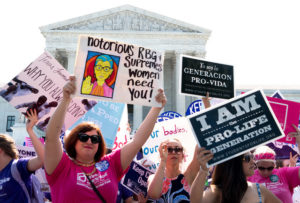
The Supreme Court strikes down restrictive Louisiana abortion law, holds that the leadership structure of the Consumer Financial Protection Bureau is unconstitutional, and much more…
IN THE NEWS
- In a 5-4 decision, the U.S. Supreme Court struck down a Louisiana law that required abortion providers to obtain admitting privileges at a hospital and affirmed the Court’s previous decision in Whole Woman’s Health v. Hellerstedt on a nearly identical Texas law. Justice Breyer authored the Court’s main opinion joined by three other justices in which he concluded that the restrictions on abortion imposed by the Louisiana law created substantial obstacles for abortion access and were not justified by any medical benefits. The requirement could have left Louisiana with only a single abortion clinic. Although Chief Justice John Roberts had dissented from the Court’s earlier decision in Whole Woman’s Health and still maintained that this earlier case had been “wrongly decided,” he provided a critical vote for the majority by honoring the precedential value of the previous decision. Nancy Northup, president of the Center for Reproductive Rights, stated that “we won an identical case four years ago…and the fact that we had to fight so hard again goes to show that nothing should be taken for granted when it comes to protecting abortion rights.”
- In a 5-4 decision, the U.S. Supreme Court held that the leadership structure of the Consumer Financial Protection Bureau (CFPB) violates the U.S. Constitution’s separation of powers. The CFPB is led by a single director appointed by the President and confirmed by the U.S. Senate. According to the statute creating the CFPB, the director serves a five-year term and cannot be removed by the President without cause. The Court noted that the director has significant power over the U.S. economy but is subjected to little oversight. Although the Court held that the CFPB can continue to operate, the director must be “removable by the President at will.” In dissent, Justice Elena Kagan warned that the decision “wipes out a feature of that agency its creators thought fundamental to its mission—a measure of independence from political pressure.” Senator Elizabeth Warren (D-Mass.), who helped create the CFPB, tweeted that despite repeated challenges, “the CFPB is here to stay.”
- The U.S. Food and Drug Administration (FDA) issued guidance to assist the clinical development and vaccine licensing processes for the prevention of COVID-19. For regulatory approval, the guidance indicates that a vaccine must be shown to prevent disease, or decrease its severity, in at least 50 percent of the people who receive it. Drug companies will also be required to monitor the vaccine’s performance after approval. FDA Commissioner Stephen M. Hahn emphasized that the agency issued the guidance in part to reduce possible skepticism about any COVID-19 vaccines that the agency approves because any approval will be “based on science and the available data.” Paul Offit, director of the vaccine education center at the Children’s Hospital of Philadelphia, reportedly called the guidelines “reassuring” because they should help ensure that vaccine approvals will be based on effectiveness as opposed to political pressures.
- President Donald J. Trump’s reelection campaign, the Republican National Committee, and four Pennsylvania Republican members of the U.S. Congress sued Pennsylvania Secretary of the Commonwealth Kathy Bookvar and all 67 county election boards over mail-in voting and counting ballots. In 2019, Pennsylvania Governor Tom Wolf signed into law a bill that established vote-by-mail for any reason. The President’s campaign argued in its court filing that during the recent primary, counties used procedures not outlined in the law, including delivering ballots to locations other than county boards of elections. Sinceré Harris, executive director of the Pennsylvania Democratic Party, reportedly claimed that the lawsuit aimed at “suppressing the voices of Pennsylvanians because they know the easier it is for everyday people to vote, the more likely it is that they will lose.”
- British Foreign Secretary Dominic Raab announced that the United Kingdom will give a special path to citizenship to any resident of Hong Kong who holds British National Overseas status. More than 2.9 million of Hong Kong’s 7.5 million residents are eligible for the program. Under the new policy, eligible individuals will have the right to live and work in the United Kingdom for five years and then apply for settled status and citizenship. This announcement directly followed China’s implementation of a new Hong Kong security law that forbids anti-communist speech, gives China authority to bring criminal charges directly against Hong Kong citizens, and carries stiff punitive consequences. Some members of Congress are considering making similar efforts. A bill introduced to the U.S. House of Representatives would give Hong Kong residents refugee status.
- The U.S. Environmental Protection Agency (EPA) announced that on August 31 it would be ending its suspension of compliance obligations for entities affected by the coronavirus. The suspension policy drew criticism from environmental nonprofits who argued that the policy was an excuse to protect polluters and led to lawsuits from nine state attorneys general. EPA Assistant Administrator Susan Parker Bodine explained that the timing of the reversal stems from the lifting of coronavirus social distancing restrictions. In the announcement, Bodine wrote that, until August 31, “entities should make every effort to comply with their environmental compliance obligations and the policy applies only to situations where compliance is not reasonably practicable as a result of COVID-19.”
- The U.S. Supreme Court declined to hear a lawsuit filed by four people on death row who challenged the U.S. Department of Justice’s single drug lethal injection protocol, which amended the previous protocol that utilized three drugs. Justice Ruth Bader Ginsburg and Justice Sonia Sotomayor indicated that they would have granted hearing the case. The federal government has not executed anyone since 2003 due in part to a shortage of drugs used in the previous three drug execution protocol. In April, the U.S. Court of Appeals for the District of Columbia Circuit held that the federal government could use the single drug lethal injection protocol for executions, prompting the appeal to the Supreme Court. Ruth Friedman, an attorney for the appellants, reportedly criticized the Court’s decision not to hear the case because “the federal death penalty is arbitrary, racially-biased, and rife with poor lawyering and junk science,” such that “there must be appropriate court review before the government can proceed with any execution.”
- The California Air Resources Board unanimously adopted a rule that all commercial trucks sold in California must be completely zero-emission by 2045. The new rule covers pickup trucks, delivery vehicles, and semi-trailers. It also requires an increasing percentage of new truck sales to be zero-emission starting in 2024. In a statement, California Air Resources Board Chair Mary D. Nichols said that “while the automobile has grown cleaner and more efficient, the other half of our transportation system has barely moved the needle on clean air.” Trucking industry representatives responded with concern that electricity infrastructure and monetary incentives will be necessary to make a fleet of fully electric trucks successful.
- The U.S. Department of Labor proposed exemptions under the Employee Retirement Income Security Act that would allow investment advice fiduciaries—such as investment advisers, broker-dealers, banks, and insurance companies—to receive compensation for providing advice about retirement accounts. Financial advisors would qualify for the exemption if they comply with impartial conduct standards that require charging reasonable compensation and prohibit advisors from making misleading statements. The proposed exemptions would replace a vacated Obama-era fiduciary rule that proponents praised for protecting consumers.
WHAT WE’RE READING THIS WEEK
- In an essay in the Washington Post, Shweta Bansal, Colin Carlson, and John Kraemer of Georgetown University, refuted the idea that colleges and universities can safely open for in-person instruction this fall. They approached the issue of colleges reopening from their perspective as educators and public health researchers, concluding that COVID-19 poses a significant risk to students even if young people are generally at lower risk of death. Bansal, Carlson, and Kraemer emphasized the significant obstacles colleges and universities face in implementing a test-trace-isolate approach because of the density of campuses, the inaccuracy and availability of testing, and the resources needed to isolate a large percentage of the student body.
- In a report for the Center for Progressive Reform, law professors Thomas O. McGarity, Michael C. Duff, and Sidney Shapiro proposed federal regulatory changes to decrease workplace COVID-19 risk faced by workers in health care, meatpacking, retail, and mining industries. McGarity, Duff, and Shapiro reviewed existing workplace safety regulations outlined by the Occupational Safety and Health Administration and other agencies and then recommended steps to increase safety through enforceable restrictions under existing agency authority. They also described how workers can protect themselves through union organization and how a liability shield for businesses would undermine the rights of employees.
- In a recent National Bureau of Economic Research working paper, Simon Mongey, Laura Pilossoph, and Alex Weinberg used an empirical model to find that workers in occupations that are more likely to be affected by social distancing policies are economically vulnerable. The employees, for example, are more likely to be minorities, immigrants, and individuals with less education, as well as have fewer liquid assets and lack health insurance, compared with employees in occupations that are less affected by social distancing policies. Mongey and his coauthors also found that more economically vulnerable populations experienced larger declines in employment. Since economically vulnerable workers are disproportionately affected by social distancing policies, Mongey and his coauthors warned that these policies are a “double-edged sword” between the “economic risks under tight social distancing and health risks under relaxed social distancing.”
FLASHBACK FRIDAY
- In a 2016 essay, Jill Fisch, a professor and co-director of the Institute for Law and Economics at the University of Pennsylvania Law School, raised concerns about the unintended consequences of the U.S. Department of Labor’s fiduciary rule, which subjected financial services brokers and advisers who handle retirement accounts to the fiduciary conduct rules of the Employee Retirement Income Security Act. Fisch explained that although the motivation for the Labor Department’s rule was to prevent self-dealing, it also made financial advice less accessible and more costly. Fisch encouraged regulators to consider whether increased regulation to prevent self-dealing was worth the risk that consumers could lose access to valuable financial advice. Two years after Fisch’s article was published, the Labor Department announced that it would no longer enforce the fiduciary rule, and, earlier this week, it proposed action that would replace the rule.



